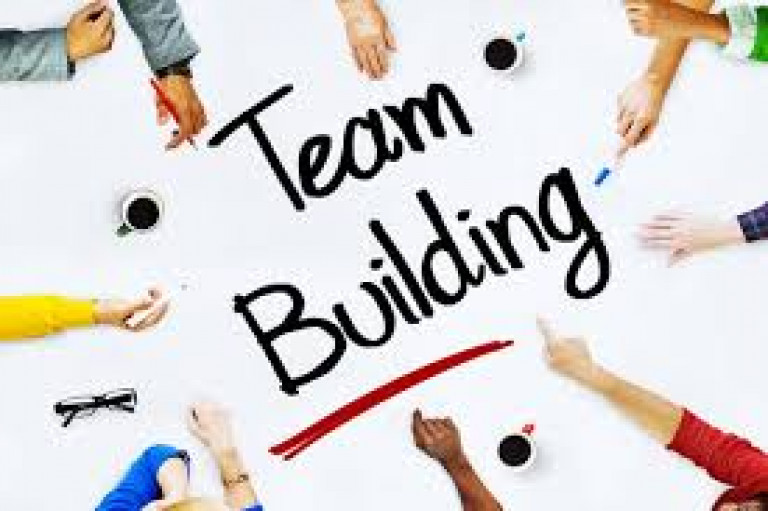In the ever-changing world of organisations, it is increasingly important to keep your teams effective, happy and engaged.
To do this, you should invest some time, effort and money into team building processes.
These tasks, games and/or activities promote cohesiveness, trust within your team.
If you're looking for an online based team building activity you can try something like QuizBreaker.

QuizBreaker is a fun weekly quiz delivered by email that helps teams get to know one another better in just 2 minutes per week. It's used by teams all over the world (including Google, Paypal and Mars Confectionery) to build trust and communication in a fun easy way. It comes with a 21-day free trial.
Click here to learn more about QuizBreaker
Alternatively here are 20 inexpensive, fun and engaging team building activities for you to use with your team.
If you're more of a reader, here are our favourite 100 books that are ideal for team building.
Although the benefits of team building are never-ending, team building isn't always done correctly and can, therefore, be a waste of time or even have a negative impact.
This is why we've researched these 10 unsung secrets, that if you follow, are guaranteed to help build you an effective, happy and motivated team.

1. Set Realistic Expectations
Nothing will encourage a team more than the expectation of success, no matter how small it is.
Set expectations on what you want your team to achieve from participating in team building activities.
Set expectations on how you want your team to get perform during tasks and activities and outline your expectations of how much time and energy you expect each team member to place into team building processes.
Finally, outline how you expect each member should behave and act throughout the team building process.
Setting expectations can motivate your team to perform better as they know what is expected of them, where they should be heading and what they need to reach.
However, you must make sure these expectations are realistic, as teams will feel discouraged if they feel things are expected of them that they cannot give.
2. Find Real Motivators
When wanting to build a stronger team and encourage people to work not only better as part of a team, but just to work better in general, it is so so so important to ensure that these team members are correctly motivated.
But, when it comes to motivation, it is not a 'one size fits all' type of thing.
A pay rise might enthuse, inspire and motivate one employee; however, recognition and personal appreciation might be enough to motivate another.
When it comes to motivation, there are lots of different motivators that you should consider; a chance to work from home, personal recognition, raises, bonuses, company cars, team activities... The list is endless.
What is important is that you find a motivating strategy which one works best for you and your team.
Here are some unique and fun apps in which you could use to motivate your employees, and here is 10 unique ways in which you could try to motivate your employees.
Whilst on the topic of motivation, I recently watched a TEDx Talk (and put my favourite in an article, check it out!) about how to correctly motivate your employees.
What I learnt, and what you should learn too, is that each employee will have a different motivational style - some are motivated by pleasure (succeeding at a task), whereas others are motivated by the avoidance of pain (avoiding failure, such a missing a deadline).
You need to pioneer your teams to ensure that each motivational fit is accounted for and that each team member can be motivated in the correct way.

3. Know The Exact Roles Of Everyone In Your Team
Every employee will have a different personality and knowing the personality of each team member will allow you to best know and understand their strengths and weaknesses, and how you can use team building activities to enhance the strengths and allow them to work on their weaknesses. You can use personality tests to figure this out.
Understanding each employees roles will also allow you to define responsibilities on specific tasks.
This will maximise the talents and contributions of each individual member, whilst still forming a sense of cohesiveness for the employees to achieve things.
Also, team building often involves changing the structure and processes of a team, so you need to understand the exact roles, and the fundamentally each role plays within the team before you go about changing each role.
4. Set SMART Goals
A bit like setting expectations, setting goals outlining what you expect from your team in general, and from team building outcomes, will encourage and unite all employees.
Setting goals gives each employee a united goal and a cohesive mission to work towards. This will create a sense of unity and trust and this will motivate people more.
However, goals must also be realistic and achievable as employees need to feel that they can reach their goals in order to be motivated.
Unrealistic goals will actually demotivate employees as they will feel that no matter how hard they work, they won't be able to reach their goals.

5. Build A Strong Team Culture
Your relationship with your employees, and their relationship with each other is incredibly important.
Teams with strong and empowering team culture will be more motivated and will work better together.
A strong team culture encourages knowledge sharing, trust and forms strong employees bonds; all things which are the fundamental framework for team building processes to happen on.
Here are five unique ways in which you can get started on building a strong and unique company culture.
6. Explain Why Team Building Is Happening
It is difficult for employees to do things successfully if they are not sure as to the reasonings as to why they are doing them.
If your employees do not understand the need for team building, it will be hard for them to fully invest their time and energy into the team building tasks in front of them.
Take time to explain to your employees the reasoning behind team building and why it is necessary.
Paint the bigger picture to your employees, including the expectations and the goals, and clearly show how team building helps your team to get there.
7. Recognise Talents And Hard Work
Everyone brings different talents, skills and ideas to a team; and recognising these will have endless benefits.
Each person will also bring different strengths and weaknesses to the team, understanding these will allow you to use each strength to your advantage by giving that employee suitable responsibilities.
David Pagotto from SIXGUN Digital Marketing Agency says:
"It's important to praise publicly, and criticise privately. When you praise publicly you create a self-reinforcing loop, whereby all employees can tangibly see what is considered good behaviour and what is expected of them."
Recognising talent and hard work will also be a huge motivating factor to your employees, as people like to be appreciated and the possibility of being recognised for their work will motivate them further to produce high-quality work.

8. Set Some Ground Rules
A team that clearly knows their boundaries will be happier and more productive, and setting rules will reinforce these boundaries.
Rules should reference how to work with each other, how to handle obstacles and how to meet deadlines.
These rules will allow everyone to know what to expect from each other, and procedures and ways in which they can overcome obstacles and meet deadlines.
Although, when setting rules, it is important that you are not too strict or restricting, as this will frustrate your employees and leave them feeling dissatisfied.
9. Know When To Lead, And When To Take A Step Back
You, as the leader, will play a fundamental role in team development and team building activities.
You must lead by example and show that you are engaged in team building.
You must know your own work style and be comfortable with your own abilities, but you must also know when you're team are capable of leading themselves and when its time for you to take a step back.
A truly effective and capable leader does not take over every task, unfairly judge their team, make assumptions on behalf of the whole team, or micromanage the team's contributions.
You should aim to have a flat and transparent structure which will act as the breeding ground for trust and will allow all team members to invest fully in team building activities.

10. Use Mentors, Coaches and/or Advisors
Have people on the inner circle that have the job of listening to, supporting and guiding each employee.
These people should be filled with wisdom, experience and should be able to guide the whole team wherever necessary. Sometimes these people could even lead group tasks, as a non-judgmental person to take control of what is needed.
"Building the perfect team is not an easy feat! However, it is one of the most important areas of focus to achieving long term success. Ensuring you have the right incentives to motivate your team's desired behaviour is one of the first components to address." Stuart Clayton, Founder & Software Developer at Digital Pigeon
Summary
So there you have it. Those are top 10 secrets to building the perfect team. We hope you learnt something new that you can implement within your own team.
"Building the perfect team is no easy task, but with time, persistence and the right tools you can make it happen." - Michael Brigham, Brigham Plumbing
"Building the perfect team starts with finding the perfect person for the job. Having robust hiring processes is one of the keys to make this happen." - Anna Elliott, Marketing Manager at Vectron & Bepoz
What's your favourite secret for building the perfect team? Post it in the comments below.




